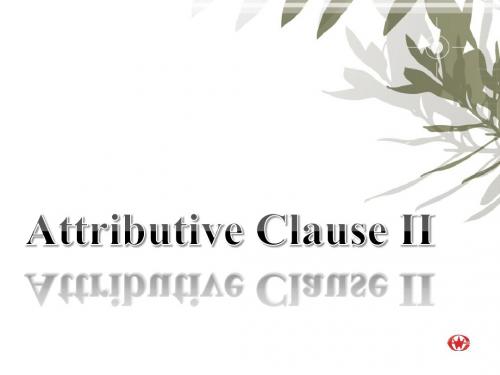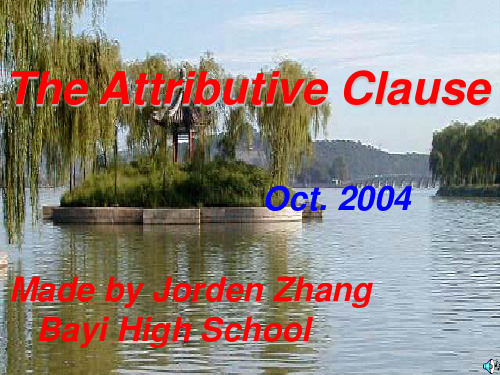高一英语必修一 Unit5 英语定语从句详细.
- 格式:ppt
- 大小:760.50 KB
- 文档页数:10


高一必修一英语第五单元ELIASx27STORY(定语从句翻译及解释)ELIAS'STORY(定语从句翻译及解释)1·The time when I first met Nelson Mandela was a very difficult period of my life . 那时候,我第一次见到纳尔逊·曼德拉是在一个非常困难的时期。
2·It was in 1952 and Mandela was the black lawyer to whom I went for advice . 在1952年曼德拉是黑人律师,我去征询他们的意见。
3·He was generous with his time ,for which I was grateful. 他很慷慨,对此我表示非常感谢。
4·The school where I studied for only two years was three kilomertes away。
我在离家三千米的学校只学习了两年。
5·However,this was a time when one had got to have a passbook to live in Johannesburg.。
但是,这个时候要居住在约翰内斯堡需要有银行存折。
6·The day when Nelson Mandela helped me was one of my happiest . 我最快乐的一天是曼德拉帮我的那天。
7·“The last thirty years have seen the great est numeber oflaws stopping our rights and progress ,untill today we have过去reached a stage where we have almost no right s at all .” "30年中已经见证了最大的法律阻止我们的权利和进步,直到今天,我们已经到了几乎没有任何权利可言的阶段。


Unit 1-5定语从句整理Unit 1:1.Do you want a friend whom you could tell everything to (=to whom you could tell everything)?2.There was a time when a deep blue sky, the song of the birds, moonlight and flowers could never have kept me spellbound.3. It was the first time in a year and a half that (=when) I had seen the night face to face.4. I am only able to look at nature through dirty curtains hanging (=which hang)before very dusty windows.Unit 2:1. At first the English spoken(=which was spoken)in England was very different from the English spoken today.2. English became less like German because those who ruled (=ruling)England spoke first Danish and later French.3. Today the number of people learning (=who learn) English in China is increasing rapidly.4. Many people believe the English spoken (=which is spoken) on TV and the radio is standard English.5. Those who reported (=reporting) the news were expected to speak excellent English.6. However, on TV and the radio you will hear differences in the way(that/ in which) people speak.7. Some people who live (=living) in the mountains of the eastern USA speak with an older kind of English dialect.8. The USA is a large country in which (=where) many different dialects are spoken.Unit 3:1. They are Dai and grew up in western Yunnan Province near the Lancang River, the Chinese part of the river that is called (=called) the Mekong River in other countries.2. We found a large atlas with good maps that showed (=showing) details of world geography.3. It makes wide bends or meanders through low valleys to the plains where (=in which) rice grows.4. Along the way children dressed (=who were dressed) in long wool coats stopped to look at us.5. We will reach Dali in Yunnan Province soon, where (=in which) our cousins will join us.Unit 4:1. It was a night (that/ when/ at which)the earth didn’t sleep.2. But the one million people of the city, who thought little of these events, were asleep as usual that night.3. It was felt in Beijing, which (=and it) is more than two hundred kilometers away.4. A huge crack that (=which) was eight kilometres long and thirty metres wide cut across houses, roads and canals.5. The number of people who were killed or seriously injured reached more than 400,000.6. Later that afternoon, another big quake which (=that)was almost as strong as the first one shook Tangshan.7. The army organized teams to dig out those who were trapped and to bury the dead.8. Workers built shelters for survivors whose homes had been destroyed.9. Your speech was heard by a group of five judges, all of whom (=and all of them) agreed that it was the best one this year.10. Next month the city will open a new park to honour those who died in the terrible disaster.11. The park will also honour those who helped the survivors.12. As you know (=As is known), this is the day(that/when/on which) the quake happened eight years ago.Unit 5:1. The time when (=that) I first met Nelson Mandela was a very difficult period of my life.2. Mandela was the black lawyer to whom I went for advice (=whom I went to for advice).3. He was generous with his time, for which I was grateful (=which I was grateful for).4. The school where (=in which) I studied for only two years was three kilometres away.5. However, this was a time when one had got to have a passbook to live in Johannesburg.6. The day when (=that/ on which) Nelson Mandela helped me was one of my happiest.7. Until today we have reached a stage where (=in which) we have almost no rights at all.8. The parts of town in which (=where) they had to live were decided by white people.9. The places outside the towns where (=in which) they were sent to live were the poorest parts of South Africa.10. We were put into a position in which (=where) we had either to accept we were less important, or fight the government.11. We first broke the law in a way which (=that) was peaceful.12. It was a prison from which no one escaped (=which no one escaped from).13. Mr Mandela began a school for those of us who had little learning.14. He taught us during the lunch breaks and the evenings when (=that)we should have been asleep.15. We read books under our blankets and used anything (that) we could find to make candles to see the words.16. I felt bad the first time (that/ when) I talked to a group.17. I remembered the beatings and the cruelty of the guards and my friends who had died.。

Unit5 单元语法详解定语从句(2)形式引导定语从句的关系副词有:when,where和why。
关系副词在从句中作状语。
有时关系副词可用“介词+关系代词”代替。
感知①I will never forget the day when( =on which) I joined the league.②Everyone wants to visit the place where(in which) Premier Zhou once worked.③We don’t know the reason why( =for which) he didn’t come on time.①是when引导的定语从句,when在定语从句中作时间状语。
②是where引导的定语从句,where在定语从句中作地点状语。
③是why引导的定语从句,why在定语从句中作原因状语。
用法一、关系副词引导的定语从句1.①when指时间,在定语从句中作时间状语。
其先行词通常为time、day、week、month、year、evening 等表示时间的名词。
July and August are the months when the weather is hot.七月和八月是天气炎热的月份。
②when 可用“in/on/at/during which ”代替。
October 1st, 1949 was the day when /on which the People’s Republic of China was founded.1949年10月1日是中华人民共和国成立的日子。
2.①where指地点,在定语从句中作地点状语,其先行词通常为place、town、city、school、country、market、company 等表示地点的名词。
I grew up in a small town where everybody knew me.我在一个小镇上长大,那里的每个人都认识我。
